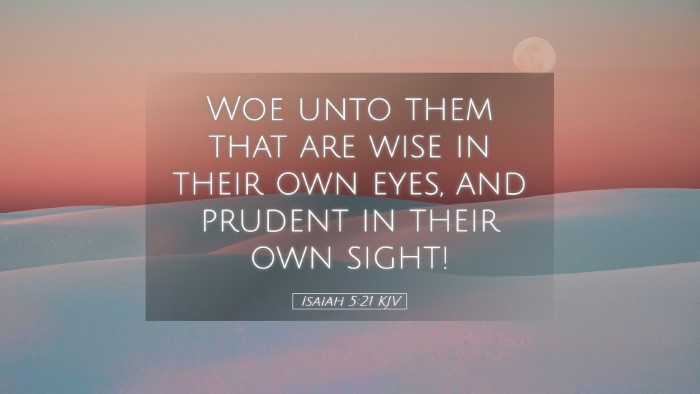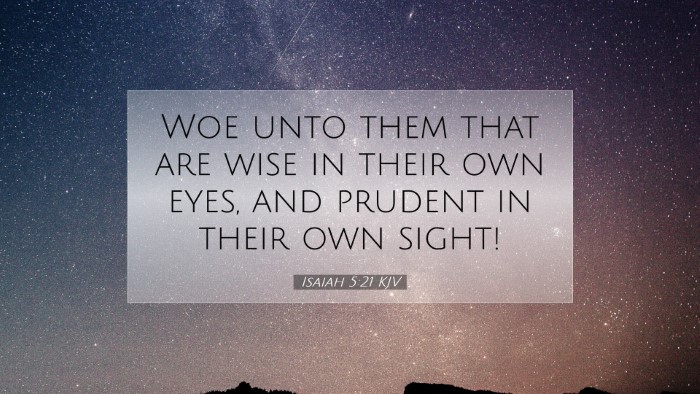Commentary on Isaiah 5:21
Verse: "Woe unto them that are wise in their own eyes, and prudent in their own sight!" (Isaiah 5:21)
Introduction
This verse delivers a profound warning against arrogance and self-deception. It encapsulates a recurring theme throughout the prophetic literature—spiritual blindness that often accompanies earthly wisdom. In assessing this verse, we draw insights from several public domain commentaries to unpack its theological implications and practical applications.
The Context of Isaiah 5
Isaiah chapter 5 serves as a denunciation of Israel's moral and spiritual decay. This chapter is famous for the "Song of the Vineyard," but as it transitions into woes, there is a poignant critique of society's values. The prophet Isaiah calls out various social sins, highlighting how a culture can become misguided in its pursuit of wisdom.
Matthew Henry's Insights
Matthew Henry emphasizes the danger of self-reliance, explaining that those who believe themselves to be wise often exhibit a profound ignorance of their true condition. Henry notes that such individuals not only lack divine insight but also refuse to submit to God's guidance. He states that "the wise in their own eyes" are usually those who rely on their moral reasoning while dismissing God's law.
Albert Barnes' Commentary
Albert Barnes expands on the notion of “prudence” in this verse. He describes prudence as a quality that, when separated from divine wisdom, distorts reality. According to Barnes, individuals who embody this self-sufficiency ultimately fill their lives with hollow reasoning, believing that their human judgment is superior to divine wisdom. He asserts the importance of humility and recognition of one's limitations in understanding God's will.
Adam Clarke's Analysis
Adam Clarke provides a theological reflection that links this verse to the broader theme of reliance on God. He argues that true wisdom comes from a fear of the Lord (Proverbs 1:7) and that distancing oneself from this fear leads to spiritual peril. Clarke cautions against the dangers posed by intellectual pride and reliance on one's own understanding, which can lead to a misinterpretation of God's truth.
Implications for Pastoral Practice
For pastors, the admonition in Isaiah 5:21 serves as a strong reminder to remain grounded in God's Word rather than succumbing to cultural pressures or personal biases. Here are a few key practical applications:
- Encourage Humility: Pastors should model humility and demonstrate reliance on Scripture in preaching and teaching, reminding congregants that all wisdom is rooted in God.
- Teach Discipleship: Encourage a culture of discipleship where individuals seek to grow in their understanding through prayer and study, rather than solely through intellectual pursuits.
- Challenge Cultural Wisdom: Pastoral teachings should critically engage societal norms and philosophies that conflict with biblical truths, exposing their inadequacies before God’s standards.
Theological Reflections
Theologically, this verse challenges the dichotomy between worldly wisdom and divine wisdom. It draws on the principle found in 1 Corinthians 1:25, where Paul articulates that "the foolishness of God is wiser than men." This resonates with the themes of Proverbs, where wisdom calls out, contrasting the understanding of earthly men with the knowledge of God. Isaiah's prophetic words remind theologians to critically reflect on their philosophical presuppositions.
Wisdom and Revelation
Understanding God’s revelation should be the foundation of any theological framework. The verse calls attention to the necessity of divine revelation as opposed to the mere accumulation of knowledge. Scholars and theologians must remain vigilant against intellectual pride that can cloud spiritual understanding.
Spiritual Application for Individuals
For individual believers, the verse is a clarion call to examine one's heart and motives. Personal reflection in light of Isaiah 5:21 can lead to transformative spiritual growth:
- Self-Reflection: Believers should regularly engage in self-reflection, asking whether their choices and reasoning align with God’s will.
- Seek God’s Wisdom: Embrace James 1:5, which instructs believers to ask God for wisdom, relying on His guidance over personal understanding.
- Accountability: Engage in communities that encourage accountability in spiritual matters, helping to guard against pride and self-sufficiency.
Conclusion
The prophetic voice of Isaiah in 5:21 warns against the pitfalls of self-conceit and intellectual pride. Drawing from the insights of Matthew Henry, Albert Barnes, and Adam Clarke, we are reminded that true wisdom is found in a humble submission to God’s authority. This passage challenges pastors, theologians, and all believers to seek wisdom not from their own devices, but from the Lord, living out a faith that recognizes our need for divine guidance.


